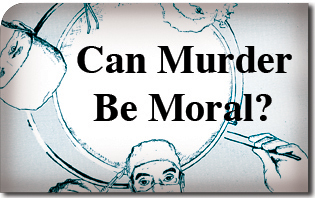 If euthanasia follows as a logical consequence of abortion, then why not kill those who are deemed to have lost autonomy and functional abilities in order to harvest their organs? Such arguments can be found in a recent article in the Journal of Medical Ethics titled “What Makes Killing Wrong?” by Walter Sinnott-Armstrong and Franklin Miller.
If euthanasia follows as a logical consequence of abortion, then why not kill those who are deemed to have lost autonomy and functional abilities in order to harvest their organs? Such arguments can be found in a recent article in the Journal of Medical Ethics titled “What Makes Killing Wrong?” by Walter Sinnott-Armstrong and Franklin Miller.
The authors attempt to blur right and wrong by suggesting that if a person has lost functional abilities, therefore, their autonomy, they are no better off living than dead. Thus, they claim, there is no reason why we cannot take their organs first and send them on their way. One of the principle arguments they present is that there is no clear definition of legitimate killing. They even erroneously cite cases where many religions support just wars and killing in justifiable circumstances such as self-defense.
Had they only looked up the definition of killing and murder, they would have limited much of their lengthy discourse. According to Merriam Webster, to kill is to deprive one of life; cause death. To murder is the crime of unlawfully killing a person, especially with malice and aforethought.
However, such a position is hardly surprising in today’s culture of death where abortion treats the unborn child in a similar manner. If an unborn child can be eliminated to “benefit” the mother, then why not allow the taking of mature human life for the benefit of the living in need of transplants? Just as the unborn child who has no “functional abilities” outside the womb can be killed, those who have lost all of their functional abilities can also be sacrificed. They argue that to kill a person in this state does them no harm because it causes them no pain and conclude that, though death is distinct from total disability, it is no worse.
Sinnott-Armstrong and Miller have conveniently ignored twenty centuries of doctrine taught and supported by saints, doctors and scholars of the Holy Catholic Church. They dismiss the teachings of Western Civilization on natural law and ethics that guarantee the rule of law. All these teachings regarding murder are, and have always been, simple and clear. Murder is always wrong regardless of the circumstances, even when the motive is supposedly to relieve pain and suffering. It is evident that murder and euthanasia violate the charity and justice owed to both God and man. Human life is a gift from God who remains sovereign over it and man has no right to deliberately destroy what belongs to God.1 Moreover, the deliberate killing of an innocent person attacks the dignity and right to life that everyone has as an image of God and as a sacred being set apart by the Creator from all earthly creatures.2
That a major journal of bioethics would even raise the question of what makes murder wrong makes one wonder where the world is headed. Like the abortion issue that attacks the unborn, if these opinions about the living gain traction in our judicial system, there will be little left to protect the sanctity of life once a bureaucrat decides that someone is no longer autonomous, productive or in possession of sufficient functional abilities.

